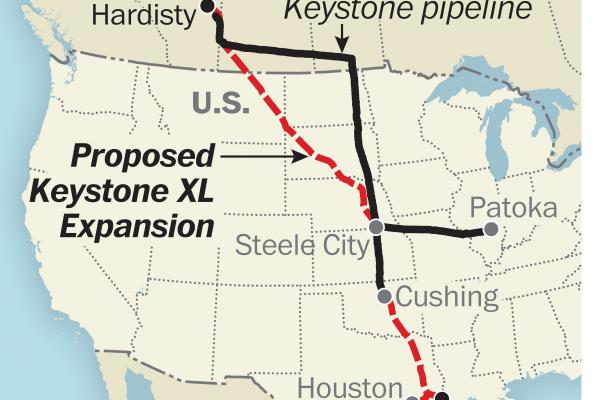“If we fully develop the tar sands, we will certainly lose control of the climate. We will get to a point where we can not walk back from the cliff,” says climate scientist Dr. John Abraham. The Keystone XL pipeline is the lynchpin to developing the tar sands in Alberta.
I’ve been paying attention to the Keystone pipeline development since 2011 when it was under review by the State Department. I joined a group of religious leaders to deliver thousands of petitions to Dr. Kerri-Ann Jones, Assistant Secretary of State for Oceans and International Environmental and Scientific Affairs, asking her to stop the pipeline. I said to her, “If this decision about the pipeline was made purely based on the climate science, we wouldn’t be here having this discussion.” She didn’t disagree. The exploitation of tar sands will significantly worsen the climate.
Now, new scientific data shows that developing the tar sands (and the pipeline to carry it) is worse than previously known. The video above shows climate scientists countering the notion that the climate impacts of the Keystone XL pipeline are small compared to total U.S. global greenhouse gas emissions. Nathan Lemphers, a Senior Policy Analyst with the Pembina Institute, details how the Keystone XL is a critical ingredient to significant expansion of tar sands. He dispels the myth being promoted by the tar sands oil industry that tar sands development is inevitable with our without Keystone XL. That’s not true. All other routes are similarly being blocked.
Lorne Stockman, Research Director for Oil Change International, announced new research that shows that the emissions from tar sands oil are worse than originally believed. This is because the climate emissions from a byproduct of tar sands, petroleum coke — which is made in the refinery process and is used in coal-fired power plants — have not been previously considered.
“If Keystone is approved,” says Dr. Danny Harvey, professor at the University of Toronto, “we’re locking in several more decades of fossil fuels and higher levels of carbon dioxide and global warming.”
“Climate change is the story related to Keystone. The drought and heat wave in Texas cost Texans $5.2 billion. Hurricane Sandy cost us $70 billion,” says Dr. John Abraham, climate scientist at the University of St. Thomas. “Some people say it’s too expensive to develop clean energy. I say it’s too expensive not to.”
After the largest climate protests in U.S. history were held in Washington, D.C., in 2011, the fight against the Keystone XL went back to the regions along the pipeline route.
Hundreds have been arrested in their attempts to block the bulldozers. There are farmers engaged in numerous local law suits against TransCanada’s pressure on local governments to use “eminent domain” to force them to give up their property to the corporation. There are First Nations and American Indian communities in treaty battles to keep TransCanada’s massive machinery off their lands.
There are Buddhist nuns walking the pipeline route in prayers for the earth and her people. A 92-year-old Lakota grandmother stood in front and blocked the giant rigs hauling pipe. Twenty-somethings are launching “tree sits” in the construction path. A Baptist church in Nacogdoches, Texas, near the pipeline route, has launched a new young adult and youth ministry specifically for and with Keystone XL activists.
On Feb. 17, the movement will come back to Washington, D.C.
You come too. We need you. Now is the time for all good Americans to come to the aid of their country. And for all good Christians to come to the aid of our world’s most vulnerable.
Rose Marie Berger, author of Who Killed Donte Manning? (available at store.sojo.net), is a Catholic peace activist and a Sojourners associate editor.
Got something to say about what you're reading? We value your feedback!
